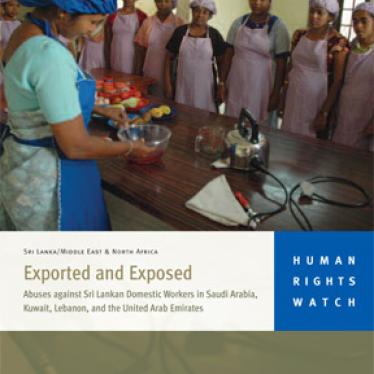(Dubai) - Sri Lankan domestic workers face serious abuses, including violence, harassment and exploitation when they migrate to work in the Middle East, Human Rights Watch said in a report released today. Human Rights Watch said the governments of Sri Lanka, Kuwait, Lebanon, Saudi Arabia and the United Arab Emirates should do more to protect women from labor exploitation and violence when they migrate to the Middle East, Human Rights Watch said in a report released today.
The 131-page report, “Exported and Exposed: Abuses Against Sri Lankan Domestic Workers in Saudi Arabia, Kuwait, Lebanon and the United Arab Emirates,” documents the serious abuses that domestic workers face at every step of the migration process. It also shows how the Sri Lankan government and governments in the Middle East fail to protect these women. The report is based on 170 interviews with domestic workers, government officials, and labor recruiters conducted in Sri Lanka and in the Middle East.
“Governments in the Middle East expose Sri Lankan domestic workers to abuse by refusing to guarantee a weekly rest day, limits to the workday, freedom of movement and other rights that most workers take for granted,” said Jennifer Turner, a researcher in the Women’s Rights division at Human Rights Watch. “For its part, the Sri Lankan government welcomes the money these women send home, but does little to protect them from exploitative bosses or labor agents.”
More than 660,000 Sri Lankan women work abroad as domestic workers, nearly 90 percent in Kuwait, Saudi Arabia, the United Arab Emirates and Lebanon. Human Rights Watch found that labor agents in Sri Lanka charge excessive fees that leave migrants heavily indebted, and often misinform them about their jobs. Once abroad, domestic workers typically labor for 16 to 21 hours a day, without rest breaks or days off, for extremely low wages of 15 to 30 US cents per hour. Some domestic workers told Human Rights Watch how they were subjected to forced confinement, food deprivation, physical and verbal abuse, forced labor, and sexual harassment and rape by their employers.
Human Rights Watch found that employers routinely confiscate domestic workers’ passports, confine them to the workplace, and in many cases restrict their communication, even with their embassy. Some employers also withhold wages for months to years at a time. In the worst cases, the combination of these practices traps Sri Lankan domestic workers in forced labor.
For example, numerous employers in Lebanon refused to allow domestic workers to return home during the July 2006 war. Human Rights Watch interviewed several domestic workers whose employers refused to return their passports and pay withheld wages owed to them so that they could return to Sri Lanka.
The labor laws of Lebanon, like the laws of Saudi Arabia, Kuwait and the UAE, categorically exclude migrant domestic workers from basic rights, such as a weekly day of rest, limits on work hours, paid holidays, and workers’ compensation. Immigration sponsorship laws restrict domestic workers’ ability to change employers, even in cases of abuse.
The report finds that Saudi Arabia’s policy of requiring employers to approve exit visas for domestic workers before they leave the country effectively traps them and greatly increases the risk of abuse and forced labor. Saudi Arabia proposed an appendix to the labor law two years ago, but it has not yet been published and the government has not to date extended equal labor protections to domestic workers.
The UAE introduced a standard contract for domestic workers on April 1, 2007, and has proposed a new law for domestic workers. Kuwait also has a standard contract for domestic workers. But the report said that these contracts give domestic workers separate and weaker protections than those in the main labor laws.
“Middle Eastern countries need to do a lot more to stop abuse of domestic workers,” said Turner. “The governments of Lebanon, Saudi Arabia, Kuwait and the UAE should extend labor laws to domestic workers, ensure their complaints can be heard and reform immigration laws so that workers aren’t tied to employers.”
Sri Lanka extends fewer protections to citizens who travel abroad to work than other labor-sending Asian countries such as the Philippines. The government fails to adequately monitor and regulate abusive practices by recruiting agents and subagents in Sri Lanka. Its consular officials often provide little or no assistance to domestic workers who approach them with cases of unpaid wages or abuse. Domestic workers returning to Sri Lanka confront obstacles to filing complaints and receive minimal services at a government-run shelter for arriving domestic workers located near the international airport.
Human Rights Watch also urged the Sri Lankan government to improve regulation and monitoring of recruitment agents, as well as services for abused workers in consulates abroad.







